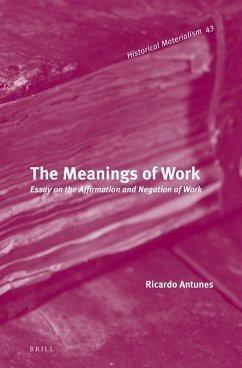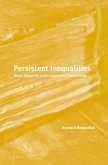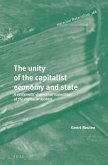- Gebundenes Buch
- Merkliste
- Auf die Merkliste
- Bewerten Bewerten
- Teilen
- Produkt teilen
- Produkterinnerung
- Produkterinnerung
Contrary to the affirmation of the end of labour, The Meanings of Work explore the complexity of the working class today; the sexual division of labour and transversalities between the dimensions of class and gender; globalisation of capital and labour.
Andere Kunden interessierten sich auch für
![Persistent Inequalities Persistent Inequalities]() Howard BotwinickPersistent Inequalities187,99 €
Howard BotwinickPersistent Inequalities187,99 €![Marxism in a Lost Century Marxism in a Lost Century]() Gary RothMarxism in a Lost Century202,99 €
Gary RothMarxism in a Lost Century202,99 €![Immanent Externalities Immanent Externalities]() Rebecca CarsonImmanent Externalities161,99 €
Rebecca CarsonImmanent Externalities161,99 €![The Unity of the Capitalist Economy and State The Unity of the Capitalist Economy and State]() Geert ReutenThe Unity of the Capitalist Economy and State368,99 €
Geert ReutenThe Unity of the Capitalist Economy and State368,99 €![Time in Marx Time in Marx]() Stavros TombazosTime in Marx222,99 €
Stavros TombazosTime in Marx222,99 €![Beyond Liberal Egalitarianism Beyond Liberal Egalitarianism]() Tony SmithBeyond Liberal Egalitarianism185,99 €
Tony SmithBeyond Liberal Egalitarianism185,99 €![Riding with the Revolution Riding with the Revolution]() Dan La BotzRiding with the Revolution210,99 €
Dan La BotzRiding with the Revolution210,99 €-
-
-
Contrary to the affirmation of the end of labour, The Meanings of Work explore the complexity of the working class today; the sexual division of labour and transversalities between the dimensions of class and gender; globalisation of capital and labour.
Hinweis: Dieser Artikel kann nur an eine deutsche Lieferadresse ausgeliefert werden.
Hinweis: Dieser Artikel kann nur an eine deutsche Lieferadresse ausgeliefert werden.
Produktdetails
- Produktdetails
- Verlag: Brill
- Seitenzahl: 272
- Erscheinungstermin: 9. November 2012
- Englisch
- Gewicht: 568g
- ISBN-13: 9789004234598
- ISBN-10: 9004234594
- Artikelnr.: 40215438
- Herstellerkennzeichnung
- Libri GmbH
- Europaallee 1
- 36244 Bad Hersfeld
- gpsr@libri.de
- Verlag: Brill
- Seitenzahl: 272
- Erscheinungstermin: 9. November 2012
- Englisch
- Gewicht: 568g
- ISBN-13: 9789004234598
- ISBN-10: 9004234594
- Artikelnr.: 40215438
- Herstellerkennzeichnung
- Libri GmbH
- Europaallee 1
- 36244 Bad Hersfeld
- gpsr@libri.de
Ricardo Antunes is Professor of Sociology at University of Campinas (UNICAMP/Brazil). He was Visiting Research Fellow at Sussex University and his books and articles has been published in France, Italy, England, Swiss, Spain, Portugal, Brazil, Mexico, Argentina, among others countries.
Foreword by István Mészáros
Preface to the English edition
Preface to the second edition
Preface to the first edition
Introduction
1. Capital's Social-Metabolic Order and its System of Mediations
The system of first-order mediations
The emergence of the system of second-order mediations
2. Dimensions of the Structural Crisis of Capital
The crisis of Fordism and Taylorism as the phenomenal expression of the
structural crisis
3. The Responses of Capital to its Structural Crisis: Productive
Restructuring and its Repercussions in the Labour-Process
The limits of Taylorism/Fordism and of the social-democratic compromise
The emergence of mass worker-revolts and the crisis of the welfare-state
4. Toyotism and the New Forms of Capital-Accumulation
The fallacy of 'total quality' under the diminishing utility-rate of the
use-value of commodities
The 'lyophilisation' of organisation and labour in the Toyotist factory:
new forms of labour-intensification
5. From Thatcher's Neoliberalism to Tony Blair's 'Third Way': the Recent
British Experience
Neoliberalism, the world of work and the crisis of unionism in England
Elements of productive restructuring in Britain: ideas and practice
British strikes in the 1990s: forms of confrontation with neoliberalism and
the casualisation of work
New Labour and Tony Blair's 'Third Way'
6. The Class-that-Lives-from-Labour: the Working Class Today
Towards a broader notion of the working class
Dimensions of the diversity, heterogeneity and complexity of the working
class
The sexual division of labour: transversalities between the dimensions of
class and gender
Wage-earners in the service-sector, the 'third sector' and new forms of
domestic labour
Transnationalisation of capital and the world of work
7. The World of Labour and Value-Theory: Forms of Material and Immaterial
Labour
The growing interaction between labour and scientific knowledge: a critique
of the thesis of 'science as primary productive force'
The interaction between material and immaterial labour
Contemporary forms of estrangement
8. Excursus on the Centrality of Labour: the Debate between Lukács and
Habermas
1. The centrality of labour in Lukács's Ontology of Social Being
Labour and teleology
Labour as the model of social practice
Labour and freedom
2. Habermas's critique of the 'paradigm of labour'
The paradigm of communicative action and the sphere of intersubjectivity
The uncoupling of system and lifeworld
The colonisation of the lifeworld and Habermas's critique of the theory of
value
3. A critical sketch of Habermas's critique
Authentic and inauthentic subjectivity
9. Elements towards an Ontology of Everyday Life
10. Working Time and Free Time: towards a Meaningful Life Inside and
Outside of Work
11. Foundations of a New Social-Metabolic Order
Appendices
Appendices to the second edition
1. Ten Theses and a Hypothesis on the Present (and Future) of Work
2. Labour and Value: Critical Notes
Appendices to the first edition
1. The Crisis of the Labour-Movement and the Centrality of Labour Today
2. The New Proletarians at the Turn of the Century
3. The Metamorphoses and Centrality of Labour Today
4. Social Struggles and Socialist Societal Design in Contemporary Brazil
References
Index
Preface to the English edition
Preface to the second edition
Preface to the first edition
Introduction
1. Capital's Social-Metabolic Order and its System of Mediations
The system of first-order mediations
The emergence of the system of second-order mediations
2. Dimensions of the Structural Crisis of Capital
The crisis of Fordism and Taylorism as the phenomenal expression of the
structural crisis
3. The Responses of Capital to its Structural Crisis: Productive
Restructuring and its Repercussions in the Labour-Process
The limits of Taylorism/Fordism and of the social-democratic compromise
The emergence of mass worker-revolts and the crisis of the welfare-state
4. Toyotism and the New Forms of Capital-Accumulation
The fallacy of 'total quality' under the diminishing utility-rate of the
use-value of commodities
The 'lyophilisation' of organisation and labour in the Toyotist factory:
new forms of labour-intensification
5. From Thatcher's Neoliberalism to Tony Blair's 'Third Way': the Recent
British Experience
Neoliberalism, the world of work and the crisis of unionism in England
Elements of productive restructuring in Britain: ideas and practice
British strikes in the 1990s: forms of confrontation with neoliberalism and
the casualisation of work
New Labour and Tony Blair's 'Third Way'
6. The Class-that-Lives-from-Labour: the Working Class Today
Towards a broader notion of the working class
Dimensions of the diversity, heterogeneity and complexity of the working
class
The sexual division of labour: transversalities between the dimensions of
class and gender
Wage-earners in the service-sector, the 'third sector' and new forms of
domestic labour
Transnationalisation of capital and the world of work
7. The World of Labour and Value-Theory: Forms of Material and Immaterial
Labour
The growing interaction between labour and scientific knowledge: a critique
of the thesis of 'science as primary productive force'
The interaction between material and immaterial labour
Contemporary forms of estrangement
8. Excursus on the Centrality of Labour: the Debate between Lukács and
Habermas
1. The centrality of labour in Lukács's Ontology of Social Being
Labour and teleology
Labour as the model of social practice
Labour and freedom
2. Habermas's critique of the 'paradigm of labour'
The paradigm of communicative action and the sphere of intersubjectivity
The uncoupling of system and lifeworld
The colonisation of the lifeworld and Habermas's critique of the theory of
value
3. A critical sketch of Habermas's critique
Authentic and inauthentic subjectivity
9. Elements towards an Ontology of Everyday Life
10. Working Time and Free Time: towards a Meaningful Life Inside and
Outside of Work
11. Foundations of a New Social-Metabolic Order
Appendices
Appendices to the second edition
1. Ten Theses and a Hypothesis on the Present (and Future) of Work
2. Labour and Value: Critical Notes
Appendices to the first edition
1. The Crisis of the Labour-Movement and the Centrality of Labour Today
2. The New Proletarians at the Turn of the Century
3. The Metamorphoses and Centrality of Labour Today
4. Social Struggles and Socialist Societal Design in Contemporary Brazil
References
Index
Foreword by István Mészáros
Preface to the English edition
Preface to the second edition
Preface to the first edition
Introduction
1. Capital's Social-Metabolic Order and its System of Mediations
The system of first-order mediations
The emergence of the system of second-order mediations
2. Dimensions of the Structural Crisis of Capital
The crisis of Fordism and Taylorism as the phenomenal expression of the
structural crisis
3. The Responses of Capital to its Structural Crisis: Productive
Restructuring and its Repercussions in the Labour-Process
The limits of Taylorism/Fordism and of the social-democratic compromise
The emergence of mass worker-revolts and the crisis of the welfare-state
4. Toyotism and the New Forms of Capital-Accumulation
The fallacy of 'total quality' under the diminishing utility-rate of the
use-value of commodities
The 'lyophilisation' of organisation and labour in the Toyotist factory:
new forms of labour-intensification
5. From Thatcher's Neoliberalism to Tony Blair's 'Third Way': the Recent
British Experience
Neoliberalism, the world of work and the crisis of unionism in England
Elements of productive restructuring in Britain: ideas and practice
British strikes in the 1990s: forms of confrontation with neoliberalism and
the casualisation of work
New Labour and Tony Blair's 'Third Way'
6. The Class-that-Lives-from-Labour: the Working Class Today
Towards a broader notion of the working class
Dimensions of the diversity, heterogeneity and complexity of the working
class
The sexual division of labour: transversalities between the dimensions of
class and gender
Wage-earners in the service-sector, the 'third sector' and new forms of
domestic labour
Transnationalisation of capital and the world of work
7. The World of Labour and Value-Theory: Forms of Material and Immaterial
Labour
The growing interaction between labour and scientific knowledge: a critique
of the thesis of 'science as primary productive force'
The interaction between material and immaterial labour
Contemporary forms of estrangement
8. Excursus on the Centrality of Labour: the Debate between Lukács and
Habermas
1. The centrality of labour in Lukács's Ontology of Social Being
Labour and teleology
Labour as the model of social practice
Labour and freedom
2. Habermas's critique of the 'paradigm of labour'
The paradigm of communicative action and the sphere of intersubjectivity
The uncoupling of system and lifeworld
The colonisation of the lifeworld and Habermas's critique of the theory of
value
3. A critical sketch of Habermas's critique
Authentic and inauthentic subjectivity
9. Elements towards an Ontology of Everyday Life
10. Working Time and Free Time: towards a Meaningful Life Inside and
Outside of Work
11. Foundations of a New Social-Metabolic Order
Appendices
Appendices to the second edition
1. Ten Theses and a Hypothesis on the Present (and Future) of Work
2. Labour and Value: Critical Notes
Appendices to the first edition
1. The Crisis of the Labour-Movement and the Centrality of Labour Today
2. The New Proletarians at the Turn of the Century
3. The Metamorphoses and Centrality of Labour Today
4. Social Struggles and Socialist Societal Design in Contemporary Brazil
References
Index
Preface to the English edition
Preface to the second edition
Preface to the first edition
Introduction
1. Capital's Social-Metabolic Order and its System of Mediations
The system of first-order mediations
The emergence of the system of second-order mediations
2. Dimensions of the Structural Crisis of Capital
The crisis of Fordism and Taylorism as the phenomenal expression of the
structural crisis
3. The Responses of Capital to its Structural Crisis: Productive
Restructuring and its Repercussions in the Labour-Process
The limits of Taylorism/Fordism and of the social-democratic compromise
The emergence of mass worker-revolts and the crisis of the welfare-state
4. Toyotism and the New Forms of Capital-Accumulation
The fallacy of 'total quality' under the diminishing utility-rate of the
use-value of commodities
The 'lyophilisation' of organisation and labour in the Toyotist factory:
new forms of labour-intensification
5. From Thatcher's Neoliberalism to Tony Blair's 'Third Way': the Recent
British Experience
Neoliberalism, the world of work and the crisis of unionism in England
Elements of productive restructuring in Britain: ideas and practice
British strikes in the 1990s: forms of confrontation with neoliberalism and
the casualisation of work
New Labour and Tony Blair's 'Third Way'
6. The Class-that-Lives-from-Labour: the Working Class Today
Towards a broader notion of the working class
Dimensions of the diversity, heterogeneity and complexity of the working
class
The sexual division of labour: transversalities between the dimensions of
class and gender
Wage-earners in the service-sector, the 'third sector' and new forms of
domestic labour
Transnationalisation of capital and the world of work
7. The World of Labour and Value-Theory: Forms of Material and Immaterial
Labour
The growing interaction between labour and scientific knowledge: a critique
of the thesis of 'science as primary productive force'
The interaction between material and immaterial labour
Contemporary forms of estrangement
8. Excursus on the Centrality of Labour: the Debate between Lukács and
Habermas
1. The centrality of labour in Lukács's Ontology of Social Being
Labour and teleology
Labour as the model of social practice
Labour and freedom
2. Habermas's critique of the 'paradigm of labour'
The paradigm of communicative action and the sphere of intersubjectivity
The uncoupling of system and lifeworld
The colonisation of the lifeworld and Habermas's critique of the theory of
value
3. A critical sketch of Habermas's critique
Authentic and inauthentic subjectivity
9. Elements towards an Ontology of Everyday Life
10. Working Time and Free Time: towards a Meaningful Life Inside and
Outside of Work
11. Foundations of a New Social-Metabolic Order
Appendices
Appendices to the second edition
1. Ten Theses and a Hypothesis on the Present (and Future) of Work
2. Labour and Value: Critical Notes
Appendices to the first edition
1. The Crisis of the Labour-Movement and the Centrality of Labour Today
2. The New Proletarians at the Turn of the Century
3. The Metamorphoses and Centrality of Labour Today
4. Social Struggles and Socialist Societal Design in Contemporary Brazil
References
Index








